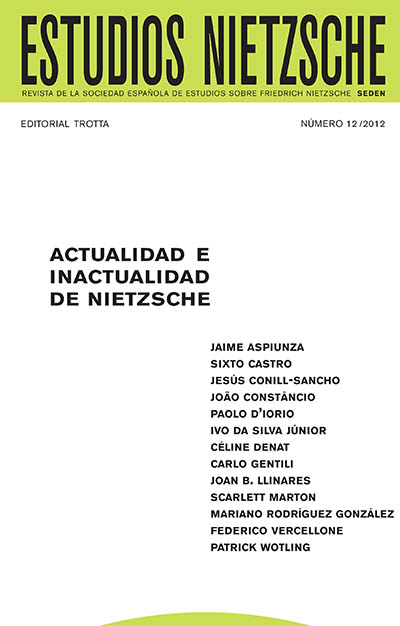Nietzsche, Language and Truth: Some Present Remarks
DOI:
https://doi.org/10.24310/EstudiosNIETen.vi12.10551Keywords:
reality, truth, truth-making, erringAbstract
It is usually said that there is no truth for Nietzsche, thus turning the German philosopher into sponsor of that sort of absolute relativism so widespread all over the geography of our educational institutions. What I try here to show and to prove is the falsity of such affirmation: Nietzsche criticizes, and dissolves, the traditional conception of truth, the idea that we —human beings— with the help of knowledge reach reality as it is. But he
does so in order to depict better what we actually do when we think we are getting hold of true reality. And what we do is the truly human truth.
Downloads
Metrics
References
Granier, J., Le probleme de la vérité dans la philosophie de Nietzsche, Paris: Seuil, 1966.
Nietzsche, F., Obras Completas, I-IV (OC ). Director ed. Diego Sánchez Meca. Madrid: Tecnos, 2011-2016
Nietzsche, F., Correspondencia I-VI. (CO). Director ed. Luis E. de Santiago Guervós. Madrid : Trotta, 2005- 2012.
Nietzsche, F., Fragmentos Póstumos I-IV (FP). Director ed. Diego Sánchez Meca. Madrid: Tecnos, 2006-2010.
Santiago Guervós, Luis E. de, Arte y poder. Aproximación a la estética de Nietzsche,, Madrid: Trotta, 2003.
Downloads
Published
How to Cite
Issue
Section
License
As of issue 21 (2021) this journal is published only in open access (diamond route).
From that number 21, like the previous numbers published in NIETZSCHE STUDIES, they are subject to the Creative Commons Acknowledgment-NoComercia-ShareIgual 4.0 license, the full text of which can be consulted at <http://creativecommons.org/licenses/by-nc-sa/4.0 >
It is the responsibility of the authors to obtain the necessary permissions of the images that are subject to copyright.
This work is licensed under a Creative Commons Attribution-NonCommercial-ShareAlike 4.0 International License.
Copyright generates two different rights: moral rights and patrimonial rights that EJFB recognizes and respects. Moral rights are those relating to the recognition of the authorship. They are rights of a personal nature that are perpetual, inalienable, unseizable and imprescriptible as consequence of the indivisible union of the author and his/her work.
Patrimonial rights are those that can be derived from the reproduction, distribution, adaptation or communication of the work, among others.







11.png)
